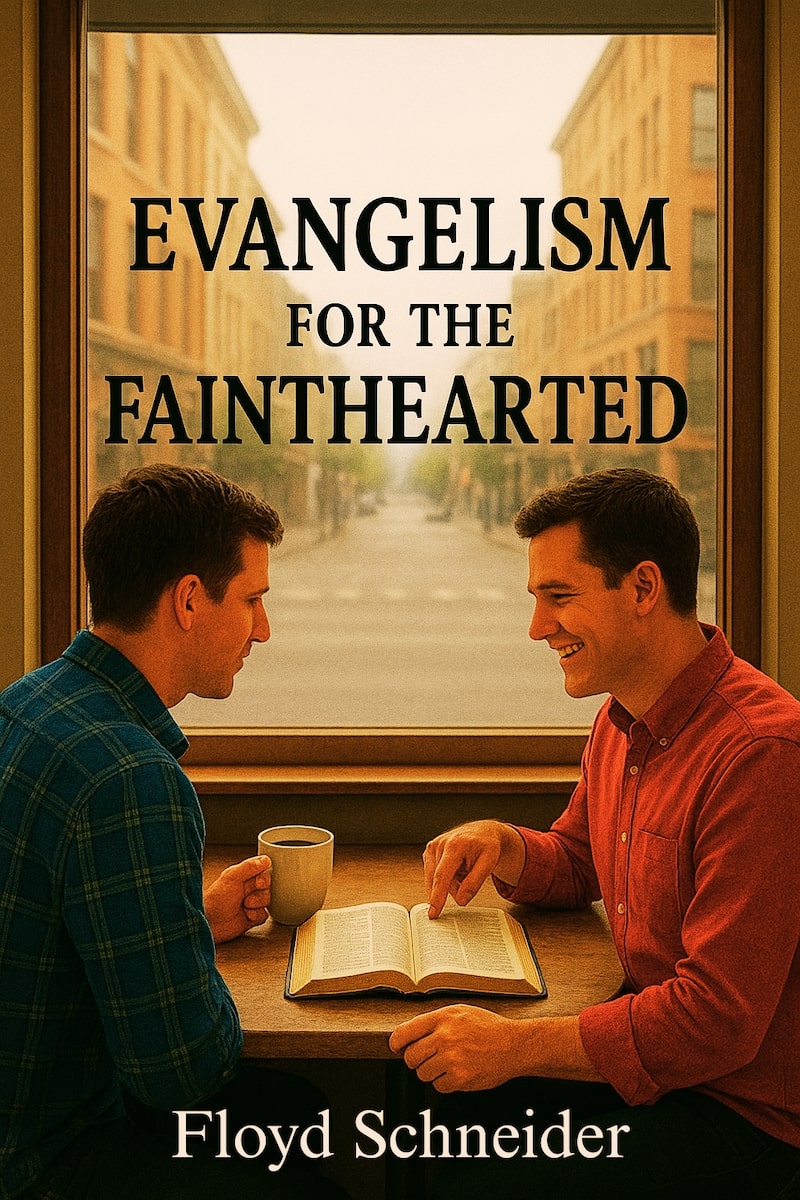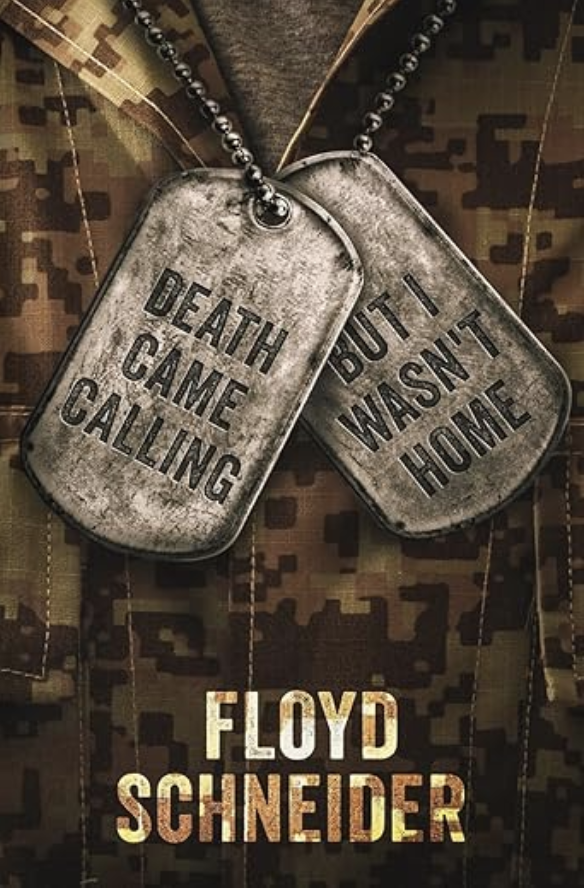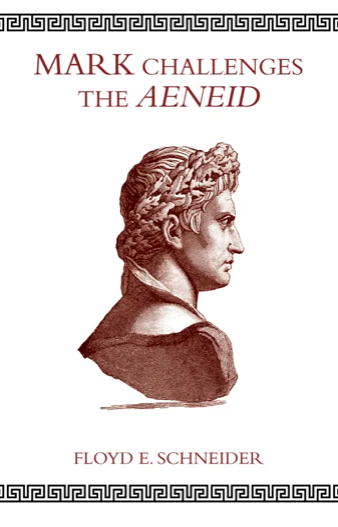Floyd's Books
EVANGELISM
REVIEWS
Floyd's fearless zeal for evangelism has provided fruit in Europe
and has challenged many of the fainthearted in North America. --Bert
Elliot, missionary to Peru (brother Jim Elliot, missionary killed by the
Auca Indians)
I told him (the author) numerous times that it
wouldn't work. He told me that I was right--because I wasn't willing to
try it. I tried it. Within the first week of using these principles,
five people wanted to read the Bible with me. --Government official in
Berlin, Germany
Floyd's Schneider's book is the ultimate
encouragement for people like me who . . . are secretly ashamed because
they're doing so poorly when it comes to evangelism. I've recognized
both the validity and the simplicity of the principles laid out by the
author and have seen them work. --Henk P. Medema, publisher, the
Netherlands. (This book was published in the Dutch language a year
later.)
Anyone who stuck it our in the missionary graveyard that
is Austria and engaged in a successful ministry of evangelism and church
planting there, is well-qualified to write a book on evangelism. We can
all learn a great deal from Floyd Schneider's experience in the hard
places. --Ian Burness, Echoes of Service, a mission agency in England
COMBAT
"Sarge, are you dead?"His question brought me back to consciousness. "Uh, no, at least I don't think so." I felt something sticky under my shirt. I reached inside my shirt, and my hand came out soaked in blood. The only thought that went through my mind was, "This is my blood on the outside of my body. This is not good."I joined the Army because I wanted freedom. My high school principal told me that I needed to grow up. We arrived in Vietnam on Dec. 15, and on Christmas day 1967, I grew up. A "training mission" turned into a full-scale firefight. Surrounded by killing and death, I had no time to reflect on my expectations of combat. We searched the bodies of those we had killed for any traces of information about their units. We treated our wounded. We put our dead on helicopters, and we returned to base as "experienced" combat soldiers. Why did I survive, and others did not? Although I puzzled over that question, it became clear that my job in combat, as a squad leader, was just to stay alive, keep my men alive, and kill the enemy. If I died in the process, so be it. I just didn't want my mother to suffer the loss of her only child. Schneider received four Purple Hearts, three in one day. He also received an Army Commendation Medal with V for valor. While his squad was under fire and he was wounded, he rescued three of his wounded men and continued to direct his squad.
GET YOUR COPY NOW
RUSSIA
Russia, 1997-1998
Learning the language in order to bring the Gospel to people has a hidden drawback. The more they helped us with the language, the closer our relationship grew with them. And then it really hurt to say goodbye.
We spent only four weeks with some Russians learning their language, but at the end of our time, a number of them begged us to stay much longer. We couldn’t. The language school moved us every month to a new city in Russia, and after our first city of Nizhni Novgorod, we realized that we would never see those people again. Our extremely primitive language ability and only four weeks. We at least gave them all a Russian New Testament. We placed on trust in God’s Word, that if they were true seekers, they would eventually find our Savior (Matthew 7:7-8). But as our language ability improved, the faster and closer our relationships grew with them, and the harder it was too leave.
But what about all those Russians in those other cities who had never heard?
By the time we returned to St. Petersburg, we had decided to stay there long-term.
God had other plans for us.
THEOLOGY
Fearful that God might not have chosen you for heaven? Wondering how God can judge people and send them to hell when He never gave them a chance to choose Him? You’re not alone. Calvinism, with its emphasis on God’s arbitrary will and predestination, has left many people anxious and confused about their spiritual standing before God. The solution is simple. Put those theology books aside and examine the Bible texts that teach how God “chooses” people for heaven.
After receiving four degrees in theology, including a PhD in Systematic Theology, and engaging in numerous discussions with perplexed believers who were confused by the contradictions within Calvinism, I finally decided to write a book that focuses on the Biblical text rather than theological constructs. Why? After working with people from three different cultures, I have concluded that the average person, without any formal theological education, can easily understand the Bible more deeply than most theologians realize.
In my book, I dismantle the fears instilled by Calvinist teachings, offering a fresh perspective grounded in Scripture rather than theology. I carefully analyze Bible texts and demonstrate how the Bible does not support Calvinism’s core tenets. This work is not just an academic exercise—it’s a spiritual relief, offering clarity and reassurance to those who feel lost in a web of theological constructs.
What will my book do for you? It will teach you:
How God uses freedom.
How God’s sovereignty is greater than Calvinism allows.
How God’s sovereignty and man’s responsibility are not opposites.
How Calvinism takes verses out of context to support Calvinistic theology.
How theology, instead of the Bible text, is the foundation of Calvinism.
How much God-given ability has God given humans to respond to God’s call after the Fall?
How much responsibility God has placed on the unsaved.
The Bible text concerning the predestination of Israel.
The Biblical teaching about hardening hearts.
The difference between assurance of salvation and our security of salvation.
The intended audience of the warnings in Hebrews.
The Bible’s definition of human sin nature.
What the Bible says about the mysteries of God.
A summary of the key passages and phrases misinterpreted by Calvinism.
A summary of definitions of this subject’s main biblical and non-biblical keywords. Non-biblical words refer to theological terms not found in the Bible but have been created to teach a topic.
Get your copy of my book now to embark on a journey of discovery, where the Bible’s truth lights the path away from fear and into a clearer understanding of God’s true nature and His sincere offer of salvation to all.
MARK versus Rome
Most scholars believe that Mark wrote his Gospel to the Romans.
True: but in addition to presenting the Gospel to the Romans, Mark
actually contextualized his Gospel by challenging the leading propaganda
of his day, Virgil's Aeneid. The Roman poet, Virgil, wrote his
masterpiece epic poem, the Aeneid, to promote the myth that Caesar
Augustus was the son of god. The Aeneid went viral almost immediately
upon publication in 19 BC, becoming Rome's premier piece of propaganda
that promoted Augustus as the emperor who would bring peace to the
world. Within the first century, the Aeneid reached from Masada to
northern Britain and became a foundational piece of Roman education.
Mark's mother, Mary, and his uncle, Joseph/Barnabas, raised him in
wealth, and educated him in the four languages of Hebrew, Aramaic,
Greek, and Latin. They drew him to Jesus, and Barnabas took Mark on the
first missionary journey. Mark spent time with Peter in Rome, where Mark
wrote his Gospel in Greek. Mark most certainly had direct access to the
most influential piece of Latin literature, the Aeneid, and he wrote
his masterpiece Gospel comparing Augustus with Jesus, the true Son of
God.




